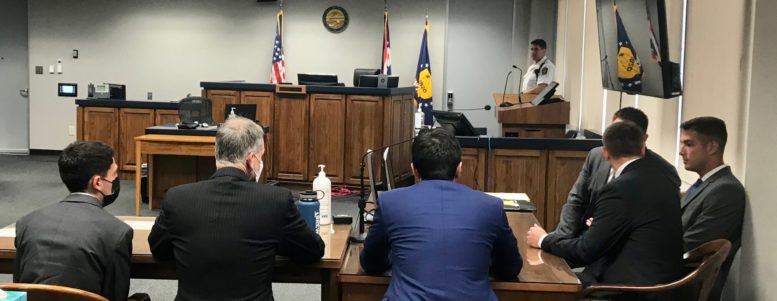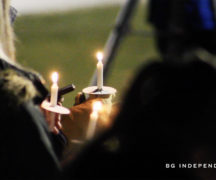By DAVID DUPONT
BG Independent News
Two former BGSU students were found not guilty of all felony charges related to the hazing death by alcohol poisoning of Stone Foltz.
The 12-member jury did find Jacob Krinn, 21, Delaware, and Troy Henricksen, 24, of Grove City, guilty of multiple misdemeanor counts.
The verdict was returned this afternoon (May 27) in Wood County Common Pleas Court with Judge Joel Kuhlman presiding.
Foltz died March 7, 2021, after drinking a liter of bourbon at a Big Little event held by the Pi Alpha Kappa, PIKE, fraternity on the night of March 4.
Krinn was found not guilty of first and third degree felony involuntary manslaughter, reckless homicide, and felonious assault. He was found guilty of hazing, failure to comply with underage drinking laws, and obstructing official business, all misdemeanors.
Henricksen, 24, of Grove City, was found not guilty of third degree felony involuntary manslaughter, reckless homicide, and tampering with evidence. He was found guilty of eight counts of counts of hazing involving all members of the PIKE new member class and seven counts of failure to comply with underage alcohol laws, for the seven new members who drank at the fraternity event.
Sentencing for Krinn was set for July 8 and July 29 for Henricksen.
Samuel Shamansky who represented Krinn said his client was “grateful, relieved, like the happiest man on the face of the earth.”
His life over the last 14 months has been “like hell on earth,” the attorney said. He was “wrongfully accused and labeled a killer.”
Asked if Krinn was remorseful, Shamansky said: “We’re not done with the process .We have a long way to go.”
He added Krinn was the kind of person anyone would be proud to have as a son and such a person would feel remorseful “over the loss of life regardless of the circumstances.”
Eric Long, who defended Henricksen, said, his client was “conflicted.” He was cleared of the most serious felony charges that the state “felt necessary to bring.”
But his life has been on hold for the past 14 months. “I don’t say that in comparison to the lostson the other side,” Long said.
He reiterated his claim that Henricksen was charged because he personified the fraternity having served in several key positions, including president as well as being new member educator at the time of the events that led up to Foltz’s death.
Long said he didn’t think that Henricksen regretted his service to the fraternity, but he did regret not attending the Big Little event on March 4, 2021. He told police that he would have intervened, and the tragedy would have been averted.
“I don’t think anyone that was involved or knew Mr. Foltz doesn’t have some regret that they could have done some things differently,” Long said.
Henricksen will now continue his career in the military, having enlisted when he was 17. He will now be commissioned as an officer.
Both Shamansky and Long left open the possibility of filing appeals.
Wood County Prosecutor Paul Dobson said he was proud of the work his team and the Bowling Green Police Division did. “I feel very proud of my team,” though the result wasn’t what “ we felt it should have been.”
He also said he appreciated the work of the jury. The members, like all juries, put their hearts into their deliberations.
Dobson said he would not change his approach to the case at all.
The hazing misdemeanors carry a penalty of up to 30 days in jail and the charge of furnishing alcohol to a minor carries a maximum sentence of six months in jail. He said discussions of what sentences his office will seek have not started.
Foltz’s parents, Shari and Cory Foltz, who were present throughout the trial, were “very pleased that the hazing charges resulted in convictions,” Dobson said. “That’s obviously what we all want to have stopped. It results in tragic situations like this.”
People are seriously injured, hospitalized, or, in the case of Stone Foltz, die “for essentially no reason.”
Their son’s death has resulted in the passage of Collin’s Law, named for another hazing victim, that makes hazing a felony. The bill was signed into law last July.
Krinn and Henricksen were prosecuted under the old statute.
Rex Elliott, managing partner of Cooper Elliott, said “this would have been a very different result if the Ohio Legislature had enacted Collin’s Law when it should have.”
The hazing conviction would now be a felony and carry a prison sentence.
[RELATED: BGSU student’s death gives added push to anti-hazing legislation]
As it is, Krinn and Henricksen were expelled from college, and the case will be permanently in their records, he said. Their families also bore the financial burden of their legal defense.
The law’s harsher penalties may have even deterred PIKE from holding the Big Little.
The Foltz family had an “excruciating two weeks” during which they had “to relive what happened to Stone 15 months ago,” Elliott said. “It has not been easy.”
That included viewing photos and videos of their son on the night he consumed the liter of whiskey that killed him.
The fight, Elliott said, is not over. He noted that at least five people have died from hazing related incidents since Stone Foltz’s death.
The family has filed a civil suit against the active members of the fraternity, and that is ongoing.
“We’re taking a very close look at BGSU and their role in the death of Stone Foltz,” he said.
“These kids need to have consequences for this behavior,” Elliott said. But “where are the adults who set up this entire system? Where are the national fraternities to police these young men they bestow memberships to?” Universities bear some responsibility for the activity on their campuses.
“That’s the big question,” he said. “These kids are responsible. But they are only behaving within a system created for them by national fraternities and universities.”
If hazing cannot be eliminated, he said, then Greek organizations should be banned from campuses.





